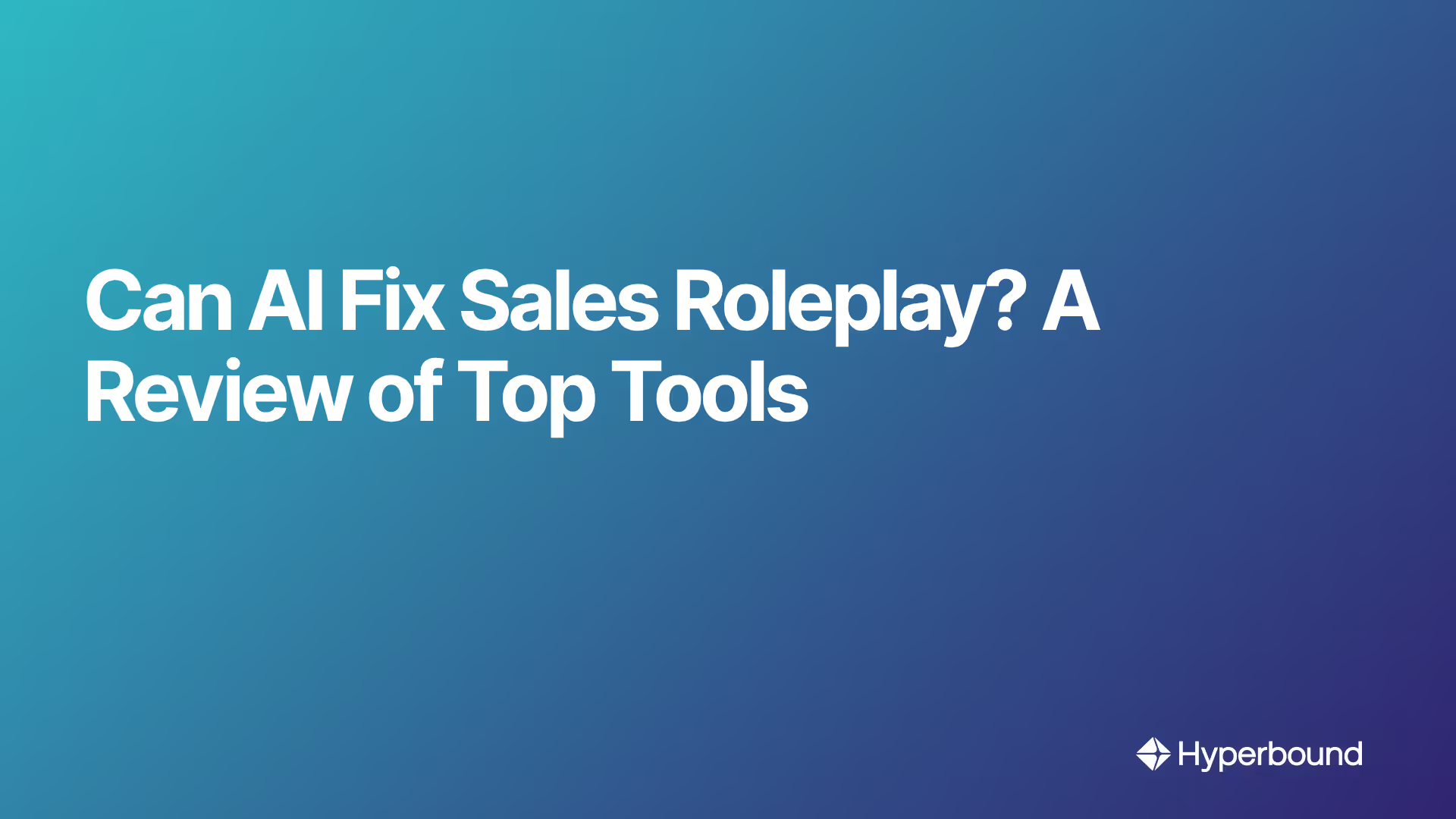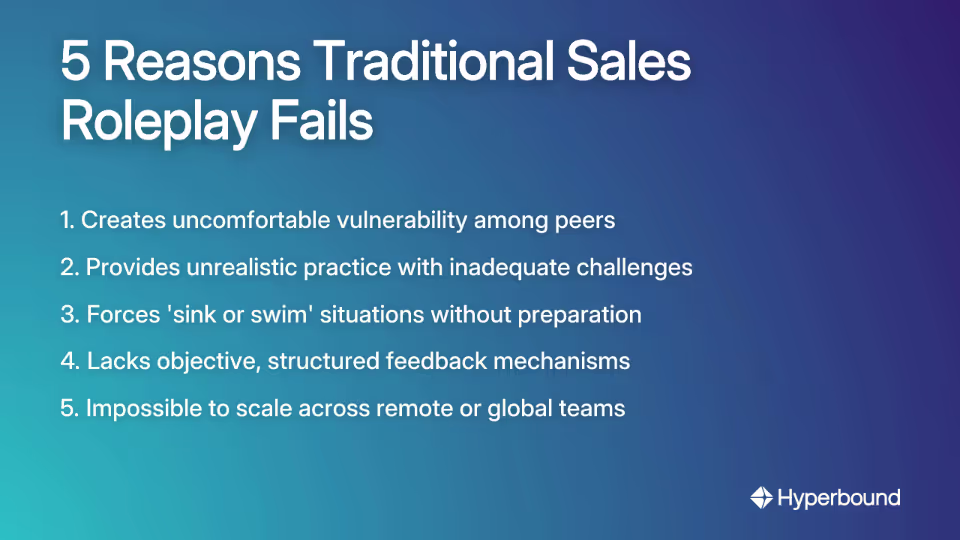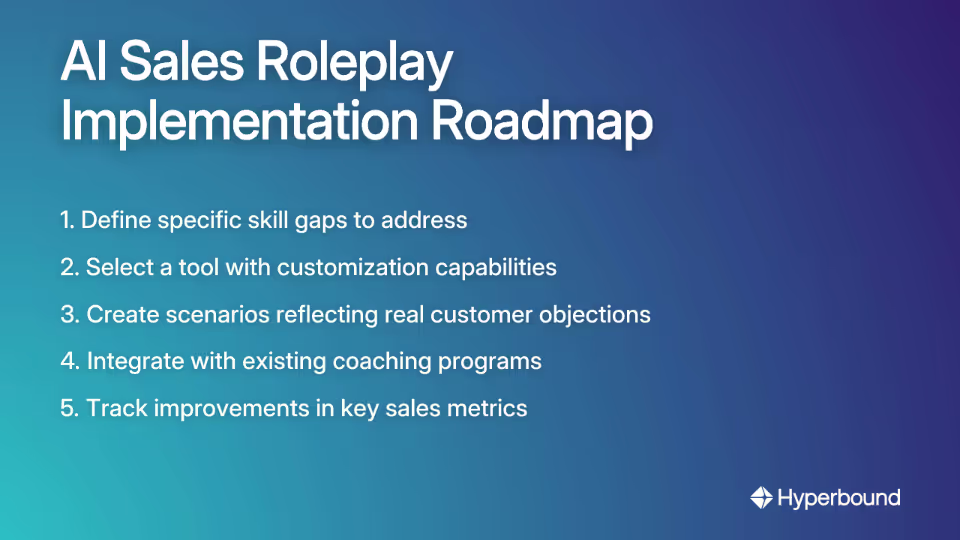
You've just finished a team meeting, and your sales manager enthusiastically announces, "Let's pair up for some roleplaying!"
The room goes silent. A few awkward glances are exchanged. Someone whispers, "It's freaking awkward." Another veteran rep rolls their eyes, thinking about the softball objections they're about to receive that bear no resemblance to what happens in real calls.
Sound familiar?
Traditional sales roleplay—that decades-old staple of sales training—is widely considered one of the most uncomfortable and ineffective parts of the job. In fact, a recent informal survey of sales professionals found that the vast majority find it "awkward," "dated," and "a waste of time."
But what if there was a better way to practice? One that didn't involve the vulnerability of stumbling through a mock sales call in front of judgmental peers? One that could actually prepare you for the unpredictable chaos of real customer conversations?
Enter AI-powered sales roleplay tools—a rapidly growing category that promises to transform how sales teams practice their craft. But can artificial intelligence really fix what's broken about sales roleplay? Let's dig in.
Why Traditional Sales Roleplay Falls Short
Before we explore the AI alternative, let's acknowledge why traditional roleplay often fails:

1. The Awkward Factor
"It makes you vulnerable in front of your peers," explains one sales professional on Reddit. This vulnerability creates anxiety that prevents genuine practice. In fact, research shows 75% of employees experience anxiety over difficult workplace conversations, making roleplay feel more like a performance than a learning opportunity.
2. Unrealistic Practice Partners
Your colleagues aren't professional actors, and they're often terrible at mimicking real prospects. As one SDR puts it: "Most assigned roleplay partners don't do it well. They aren't pushing the 'no' realistically." Instead, they lob softballs that don't challenge you to improve.
3. The "Sink or Swim" Mentality
Many sales leaders adopt a "baptism by fire" approach, throwing reps into real customer calls with minimal preparation. "The best practice is with clients—sink or swim," argues one sales veteran. While there's truth to learning from real interactions, this high-pressure approach can reinforce bad habits and damage confidence.
4. Lack of Structured Feedback
Peer feedback is often vague, inconsistent, or overly nice. Without objective measurement of what went well or poorly, reps walk away without actionable insights to improve their discovery calls, objection handling, or value proposition delivery.
5. Impossible to Scale
Traditional roleplay is time-intensive, pulling multiple team members away from selling activities. For remote or global teams, the logistics become even more challenging.
What is AI Sales Roleplay?
AI sales roleplay uses artificial intelligence to simulate realistic customer interactions, allowing reps to practice their skills without a human partner. These platforms create virtual buyers who respond dynamically to a rep's pitch, handling objections, asking questions, and even displaying various buyer personalities—from the eager prospect to the skeptical decision-maker.
The technology has evolved rapidly, with specialized tools now offering remarkably human-like conversations, realistic objections, and detailed feedback on everything from talk ratios to buying signals identification.

The Promise of AI-Powered Practice
1. Private, Judgment-Free Environment
AI eliminates the social anxiety of traditional roleplay. Reps can make mistakes, experiment with new approaches, and practice difficult scenarios without fear of judgment—creating a psychologically safe space for growth.
2. Always-Available Practice Partner
Unlike human colleagues who have their own quotas to hit, AI is available 24/7. Sales reps can practice a cold call before an important meeting, rehearse handling customer objections on the weekend, or work through a new pitch deck whenever inspiration strikes.
3. Consistent, Data-Driven Feedback
Rather than subjective peer opinions, AI provides consistent, objective feedback based on predefined criteria. This can include talk-to-listen ratios, filler word usage, question quality, and how well the rep handled specific objections during the sales process.
4. Customizable Scenarios
The best AI platforms allow teams to create highly specific roleplay scenarios that mirror their actual sales process—from initial cold call to discovery, demo, handling objections, and closing. You can even create AI versions of your actual prospects rather than generic pre-built bots.
5. Scalable Training
With 62% of sales enablement teams now adopting AI solutions, the ability to scale consistent training across global teams has become a significant advantage. New product launches, messaging changes, or sales methodology updates can be practiced by everyone simultaneously.
6. Measurable Results
The data doesn't lie: Organizations report significant improvements after implementing AI sales training:
- 49% improvement in sales efficiency
- 58% increase in revenue
- Reduction in onboarding time from 26 weeks to as little as 12 weeks
Choosing the Right AI Sales Roleplay Platform
While many platforms are emerging, they generally fall into two camps: comprehensive coaching platforms and niche tools. Here's how to distinguish them:
The Comprehensive Platform: Hyperbound
Overview: Hyperbound is an advanced AI Sales Coaching platform designed to be an all-in-one solution for B2B sales teams. It focuses on driving real-world results with highly customizable AI buyer bots, gamified learning, and simulation of the entire sales cycle.
Standout Features:
- AI-Powered Roleplays: Practice everything from cold calling to objection handling and renewals in a safe, repeatable environment.
- AI Real Call Scoring: Get objective, automated scoring and feedback on actual customer conversations, not just simulations.
- Customizable Scenarios: Build roleplays tailored to your specific ICPs, products, and competitive landscape.
- Gamified Learning: Drive friendly competition and engagement with leaderboards and progress tracking.
User Feedback: "Hyperbound was recently implemented by my company and I love it—gave me more structure in how to approach cold calls as I transitioned out of inbound sales," reports one user on Reddit.
Best For: B2B sales teams looking for a holistic solution that bridges practice with real-world application. It's ideal for reducing new hire ramp time, ensuring message consistency, and scaling effective coaching across the entire team.
Alternative Tools and Their Limitations
While several other tools exist, they often focus on a specific niche, which can create gaps in a complete sales readiness program. When evaluating alternatives, watch for common limitations:
- Niche Focus: Some tools, like Second Nature, specialize in soft-skill analysis through video roleplay. While useful for presentation skills, the experience can feel scripted and often lacks the deep CRM or product context needed for realistic objection handling.
- Limited Scope: Other platforms may target specific use cases. For example, Quantified is built for message compliance in regulated industries with photorealistic avatars, but this specialization can come with a higher price point and limited integration capabilities for a broader sales team. Tools like MeetRecord may offer strong CRM integration for analytics but are often more focused on team-level reporting than on providing reps with individual practice and skill development loops.
- Lack of Real-World Analysis: A major differentiator is the ability to analyze and score real customer calls, not just simulations. Many niche tools lack this capability, making it difficult to bridge the gap between practice and on-the-field performance. A comprehensive platform should connect practice scenarios directly to the behaviors seen in actual sales conversations.
The Verdict: Can AI Really Fix Sales Roleplay?
After reviewing the technology and user feedback, here's the unvarnished truth about where AI excels and where it still falls short:
What AI Roleplay Gets Right
AI definitively fixes the core process problems of traditional roleplay:
- Eliminates Awkwardness: The psychological barrier of practicing in front of peers disappears, allowing for genuine skill development rather than performance anxiety.
- Provides Consistent Challenge: Unlike human partners who throw softballs, AI can be configured to deliver realistic, challenging objections every time.
- Scales Training: From onboarding new hires to rolling out a new value proposition, AI enables consistent practice across the entire organization.
- Delivers Objective Feedback: The data-driven approach provides measurable insights rather than subjective opinions.
Where AI Still Falls Short
Despite impressive advances, AI isn't a perfect solution yet:
- Can't Fully Replicate Human Unpredictability: As one sales veteran puts it, "People are weird, man." The random, sometimes irrational behavior of human buyers remains difficult to simulate completely.
- Lacks Emotional Nuance: The subtle emotional intelligence required to read a room or pick up on non-verbal cues remains challenging for AI to replicate.
- General AI Tools Aren't Specialized Enough: Many users report that general AI tools like ChatGPT fall short at providing realistic objection handling, emphasizing the need for specialized sales platforms.
- Requires Customization for Maximum Value: Off-the-shelf solutions without customization to your specific sales process and buyer personas deliver limited value.
The Balanced Conclusion
AI isn't a replacement for real-world client interactions, but it serves as a powerful "flight simulator" for sales professionals. The best approach combines:
- AI-Powered Practice: For skill building, confidence development, and mastering the fundamentals in a safe environment.
- Manager Coaching: For strategic guidance and nuanced feedback on complex situations.
- Real-World Application: Because ultimately, client calls remain the true test of ability.
As one sales leader put it, "Practice doesn't make perfect. Perfect practice makes perfect." AI roleplay tools offer that perfect practice environment—realistic enough to be valuable, safe enough to allow experimentation, and data-driven enough to guide improvement.
How to Implement AI Roleplay Successfully
If you're considering introducing AI roleplay tools to your sales team, follow these implementation steps:

- Define Clear Training Goals: Identify specific skills gaps (discovery question quality, handling competitor objections, lead generation tactics) rather than general "improvement."
- Choose the Right Tool: Look for customization capabilities, analytics that align with your sales process, and integration with your existing tech stack.
- Customize Scenarios: Create roleplay scenarios that reflect your actual customer objections, competitive landscape, and pitch deck content.
- Integrate with Existing Coaching: Use AI as one element of your sales enablement strategy, not a replacement for manager involvement.
- Track Meaningful Metrics: Monitor improvements in key sales metrics like reduced ramp time, increased meeting conversion rates, or higher close ratios to demonstrate ROI.
Final Thoughts
Traditional sales roleplay has long been a necessary evil—uncomfortable but unavoidable for skill development. AI-powered alternatives now offer a compelling alternative that addresses the fundamental flaws of the traditional approach.
While the "sink or swim" reality of sales will always exist, AI ensures that when your reps dive into client calls, they've already mastered their strokes in a controlled environment. It transforms the awkward, ineffective practice sessions of the past into valuable learning experiences that directly translate to improved performance.
For sales leaders looking to accelerate ramp times, improve consistency, and boost overall team performance, AI roleplay tools represent one of the most promising innovations in sales enablement technology—not to replace the human element of sales, but to enhance it through better preparation and practice.

The days of cringing when your manager says "Let's roleplay" may finally be coming to an end.
Frequently Asked Questions
What exactly is AI sales roleplay?
AI sales roleplay is a training technology that uses artificial intelligence to simulate realistic sales conversations. Sales representatives can practice their pitch, objection handling, and discovery skills with a virtual AI buyer instead of a human colleague, providing a safe and repeatable practice environment.
Why is AI roleplay more effective than traditional methods?
AI roleplay is more effective because it eliminates the peer pressure and awkwardness of traditional roleplay, provides a consistent and challenging practice partner available 24/7, and delivers objective, data-driven feedback. This allows for genuine skill development in a psychologically safe space without taking other reps away from their selling time.
How does an AI sales simulator work?
AI sales simulators use advanced language models to create dynamic, interactive conversations. You can load specific scenarios, buyer personas, and common objections. The AI then responds to what the sales rep says in real-time, mimicking the unpredictable nature of a real customer call and providing instant feedback on performance.
Who benefits most from AI sales training?
All sales professionals can benefit, from new hires to seasoned veterans. New SDRs and AEs can use it to reduce ramp time and build foundational skills safely. Experienced reps can use it to practice new messaging for a product launch, refine their approach for a specific competitive threat, or master advanced sales methodologies.
What kind of feedback can I expect from an AI roleplay tool?
AI roleplay tools provide specific, measurable feedback that goes beyond subjective opinions. You can expect metrics on your talk-to-listen ratio, use of filler words, pace, the quality of your questions, and whether you successfully identified and addressed key buying signals or objections.
Can AI roleplay replace manager coaching?
No, AI roleplay is not a replacement for a manager's coaching but rather a powerful supplement to it. The AI acts as a "flight simulator" for building muscle memory and mastering fundamentals. The manager's role then evolves to providing strategic guidance, nuanced feedback on complex deals, and coaching on the emotional intelligence that AI cannot fully replicate.
Are general AI tools like ChatGPT good enough for sales roleplay?
While general AI tools like ChatGPT can be used for basic practice, they are not specialized enough for effective sales training. They often lack the deep context of your specific products, customers, and competitive landscape, leading to generic and unrealistic objections. Specialized platforms like Hyperbound are designed to create highly customized and relevant training scenarios.
How do I choose the right AI sales roleplay platform?
Look for a platform that offers deep customization, allowing you to build scenarios that mirror your actual sales process and buyer personas. The best tools also analyze real customer calls to bridge the gap between practice and performance, provide gamified learning to drive engagement, and offer comprehensive analytics to track improvement.
What's your experience with sales roleplay, traditional or AI-powered? Share your thoughts and experiences in the comments below.
Book a demo with Hyperbound
.png)













